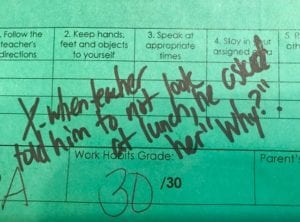As soon as he got in the van, my son confessed that he got a mark at school (a note for having done something wrong). He mentioned that there was “kind of an interesting story” to go with it and proceeded to divulge that when his class was walking to lunch, he saw the teacher’s lounge, usually very visible with glass walls, covered with paper from ceiling to floor. Overcome with curiosity about what could possibly hide behind the paper, he tried to pry a piece of the paper away from the wall to sneak a peek. When he did this, the duty teacher, someone otherwise unknown to him, told him not to look. Demonstrating his characteristic genuine, innocent, unending curiosity, he replied, wide-eyed, with, “Why?”
 What he couldn’t realize that I pieced together is that next week happens to be Teacher Appreciation Week, and I know his school goes over-the-top decorating and making it as special as they can, as special as the teachers deserve. Wanting to avoid the inevitable distraction, I’m guessing someone wisely covered the decorated lounge. It revved my son’s inquisitiveness into overdrive.
What he couldn’t realize that I pieced together is that next week happens to be Teacher Appreciation Week, and I know his school goes over-the-top decorating and making it as special as they can, as special as the teachers deserve. Wanting to avoid the inevitable distraction, I’m guessing someone wisely covered the decorated lounge. It revved my son’s inquisitiveness into overdrive.
This questioning was not received well by the duty teacher. She perceived his curiosity to be disrespectful back-talk, what many may call “sass.” Exercising her authority, she issued him a mark, which then got noted on his weekly report home and communicated right there in carpool pick-up. I don’t blame the teacher. Being a teacher myself, I know how frustrating these tiny moments of simple disobedience stack up in a day.
It was a sticky situation. He didn’t see me roll my eyes. Instead, he heard me correct him, saying, “Ok, when a teacher gives you a directive, just say, ‘yes, ma’am’ or ‘yes, sir’ and then if you really want to ask, try to find a respectful way. Maybe ‘Yes, ma’am. I’m just curious!'”
I could feel that this wasn’t fully satisfying his confusion about the situation, and I was also feeling the need for more development. I continued, “Unfortunately, when people don’t know you well, they tend to assume bad things about you. They might think you’re trying to break the rules or you’re up to no good. I know you probably weren’t trying to be disrespectful, but that’s what she thought when she saw you doing what you were doing.”
And that was it. That was the end of our conversation. We could safely end the conversation there because nothing was at stake. He defended himself saying that he worked hard all month to earn a reward for good behavior and was sad that he probably lost out on it by getting a mark. But this was a minor inconvenience, nothing more. This assumption about his character by someone unknown to him in no way hindered his success or his physical safety. And it was an absolute punch in the gut to think about how different that feels for my African-American friends raising boys.
 In the same unfair way that little girls have to learn about being more aware of their environment and how to avoid assault, little black boys have to learn the lesson of preservation and obedience early and often. They have to be taught that this very type of situation could escalate into something real, dangerous, and ultimately life-threatening. They don’t have the luxury to state their case, even politely. Instead, their only option is full compliance, with even that option potentially being dangerous. The only threat to my son was a “mark.” Others may face weapons.
In the same unfair way that little girls have to learn about being more aware of their environment and how to avoid assault, little black boys have to learn the lesson of preservation and obedience early and often. They have to be taught that this very type of situation could escalate into something real, dangerous, and ultimately life-threatening. They don’t have the luxury to state their case, even politely. Instead, their only option is full compliance, with even that option potentially being dangerous. The only threat to my son was a “mark.” Others may face weapons.
My little boy was assumed to be disrespectful and defiant because he was disobedient and unknown. There was no time for relationship development. There was only directive and response. His very character, well-intended as it may have been, still directed him to make the wrong choice. But I didn’t have to turn the conversation in the direction of life and death. I could have, sure, but I didn’t feel a societal pressure or need to in effort to protect his life in a later, similar situation. The only reason I’m even aware of this need from other races is by listening to and respecting their experiences, not discrediting them.
I was and am privileged not to have to have that conversation with my sons simply because of the color of their skin. I know that for unfortunately-similar reasons I’ll have to have uncomfortable and unfair conversations with my daughters (though conversations about consent happen often with my sons!). I’m acknowledging the double-standards, but I admit it feels so insufficient. I just wish I could do more. Until I can change the world, I’ll work on teaching my children to recognize privilege and to know and do better.



















“Say Yes Mam or yes Sir.” Not sure I agree with your opinion here. This is at the very core of problems today. If one has a black son these two responses are critically important to learn early on. As these boys get older any run in they have with authority figures should have these responses! However much trouble especially with police is due to Not Following this advice. TEACH RESPECT FOR AUTHORITY EARLY ON BLACK OR WHITE?
I truly recognize that white privilege exists, but I don’t think this scenario is related. We try to teach our children to be excited and inquisitive. And this kid is being punished for it. It said this could have been a great opportunity to talk about teacher appreciation. How difficult when the kid asks why is it just to say, it’s a surprise for the teachers.
Connie you apparently have not had to console or reassure someone who was mistreated when they respected authority. I am a Black mother with a 24 year old Black son who is extremely polite and well mannered. A former football player for Central High, a former National Guard and currently gainfully employed as an Electrician. None of that matters. He has been called racial slurs at school, during football games, at work and the times he has been stopped for speeding he has been handcuffed and placed in the back seat. If you’ve ever received a speeding ticket have you been handcuffed let alone placed in the back seat of a police car, only to be issued a ticket and sent on your way? You speak from the seat of privilege about which this article was written. It is widely misconstrued that compliance and manners will get you better treatment. Speaking from personal experience I beg to differ. Your experience and reality may not be the same for everyone. I applaud the writer for using her platform to increase awareness of the disparity that often exists.
Thank you for writing this. We need to keep getting the message out there. Obviously from even this comments section some will never hear it, but others will. We have a duty to make our children aware of this privilege and be the change in the next generation. My son is only 4 so I don’t even know yet how to begin those conversations, but I am also fortunate as you said, to not have to! This right here is key: “by listening to and respecting their experiences, not discrediting them.”
Megan, I appreciate your perspective on this situation. As a mom of 3 grown sons, I know how hard it is sometimes to not go immediately to that angry place towards the adult who obviously could have taken a few moments of her time to further investigate instead of defaulting to issuing a “mark”. Instead, your son was basically treated somewhat unfairly in this situation. By simply having a short convo with your son the duty teacher probably could have easily discerned his intention (smarty pants or simply curious). But you are wise for allowing your son to actually experience the injustice and allowing him to process his feelings about it. Our children sometimes learn far more during a negative experience than they do in times of smooth sailing. AS moms, our instincts are to smooth all of the bumps in the road to give our children happy, carefree lives. Looking back over my sons formative years, I realize that it was precisely during those “bumpy” rides when their characters developed and grew the most. However, what I appreciate the most is your comparison to parents of color and the potential life-threatening consequences that must constantly weigh on their hearts. It makes me a little crazy when a white parent says they don’t believe in “white privilege”. Too many folks equate financial stability or social status with “privilege”. Those of us who were born into a society that doesn’t value persons of color in the same way as those of us who are white, have no idea how it affects their lives. To deny it’s existence is to further it’s harmful effects. It’s very insightful of you to recognize the parallels in your experience in this situation. Keep up the good work! Cindy Shotwell